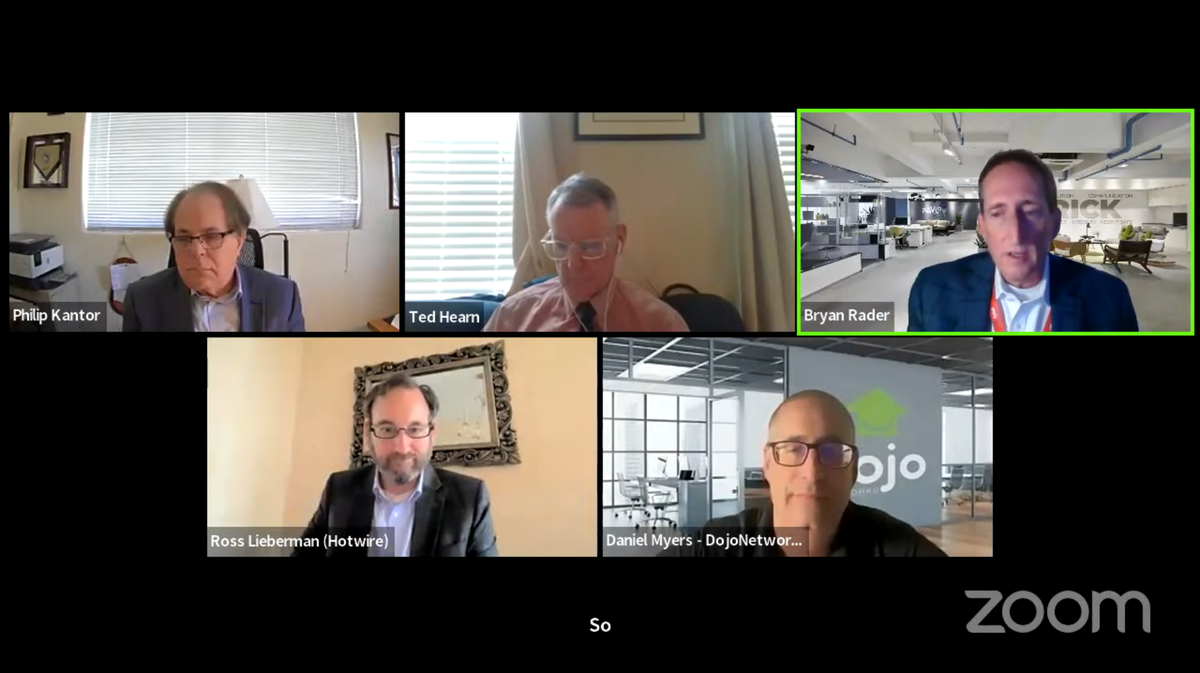
MDU
Expert panelists join the chorus of voices opposing FCCs proposed bulk billing ban on Wednesday’s Broadband Breakfast Live Online.

 Screenshot of panelists discussing FCCs proposed bulk billing ban at Wednesday’s Broadband Live
Screenshot of panelists discussing FCCs proposed bulk billing ban at Wednesday’s Broadband Live
WASHINGTON, May 9, 2024 – Consumer costs will “skyrocket” under a bulk billing ban, according to a variety of industry leaders speaking at Wednesday’s Broadband Breakfast Live Online webcast about the Federal Communications Commission’s proposal.
“Without bulk billing it’ll cause uncertainty in the business and it won’t be good for the consumers.” Philip Kantor, vice president of Blue Stream Communications, told the event.
Broadband Breakfast on May 8, 2024 – Smart Cities, Multi-Dwelling Units and Bulk Billing
Standard MDU practices like bulk billing have recently become controversial.

/
Bryan Rader, President of Pavlov Media’s Multiple Dwelling Unit division, said that “bulk has been a benefit to closing the digital divide and the gap between the haves and those that have not been able to enjoy internet experience.”
On March 5, FCC Chairwoman Jessica Rosenworcel, proposed banning bulk billing arrangements between Internet Service Providers and the owners of MDUs. As articulated, the proposal would prevent property owners from locking tenants into using their chosen providers, and instead allow households to opt out and choose their own provider.
But the proposal has been the source of extensive pushback, including from non-profit organizations like Education Super Highway.
Property owners will often make a contract with an ISP to provide service to their whole unit at a bulk rate. The FCC said this ban would build competition and improve broadband transparency, as well as lower costs.
Daniel Myers, President of DojoNetworks, said the opt-out option for tenants will ultimately drive up prices. The cost of implementing a property wide network does not change, therefore tenants choosing to opt out only increase the price on those remaining in.
“[ISPs are] lowering the price based on the fact that [they] have one hundred percent penetration. So, it will push everyone’s price up.” Myers said.
Rader explained the mounting costs that will be placed on internet users if internet providers return to a retail basis.
“Every consumer in every multi-family community will now have choice, but they will pay an installation fee, a deposit, a credit check… they’ll have to rent equipment,” Rader said.
Ross Lieberman, senior vice president of government affairs for Hotwire Communications, highlighted another benefit that he said would be lost under the ban. Allowing the option to opt out will lose tenants access to certain benefits within contracts that are only available when offered to all residents.
“You eliminate, by allowing opt out, a lot of the cost savings which include the economy of scale savings, you get starkly discounted programing prices.” Lieberman said
Kantor also pushed back against the FCCs notion that bulk billing is causing stagnation instead of competition. Kantor said that competition remains strong and even increasing under bulk billing.
“We see three, four, five companies come to each condominium… to compete, causing the price to come down, causing the service to get better, causing the equipment to get better.” Kantor said.
Pressure has mounted against the proposal by property ownership groups as well as by ISPs, including NCTA – The Internet & Television Association.
Some in the industry have defended the proposition. John Bergmayer, legal director at Public Knowledge, who was not present at the panel, said that much of the existing arrangements will persist while allowing users to opt out of paying for broadband “they don’t want or need.”
Myers acknowledged that some amount of exploitation has likely occurred under bulk billing. “I think there’s probably some bad owners out there,” Myers said.
Myers said that there should be some guardrails on actions by property owners: “If you’re gonna do bulk billing, it has to be these minimums,” he said. “The pricing shouldn’t be more than what you can get for a comparable service in the market.”

May 8, 2024 – Smart Cities, Multi-Dwelling Units and Bulk Billing
As smart home technology rapidly integrates into urban living, innovative solutions emerge to cater to the unique needs of multiple households under one roof. While this evolution is contingent on having robust broadband infrastructure in place, regulatory policies such as bulk billing have recently become more controversial under Federal Communications Commission Chairwoman Jessica Rosenworcel. What’s the optimal way to deliver high-speed internet access across these multi-unit residential buildings? How does bulk billing factor into the economics of MDUs? What role does managed Wi-Fi have in the equation?
Panelists
- Daniel Myers, President, DojoNetworks
- Ross Lieberman, Senior Vice President of Government Affairs, Hotwire Communications
- Bryan Rader, President of MDU, Pavlov Media
- Philip Kantor, Vice President and General Counsel, Blue Stream Communications
- Ted Hearn (moderator), Senior Editor, Broadband Breakfast
Broadband Breakfast on May 8, 2024 – Smart Cities, Multi-Dwelling Units and Bulk Billing
Standard MDU practices like bulk billing have recently become controversial.

